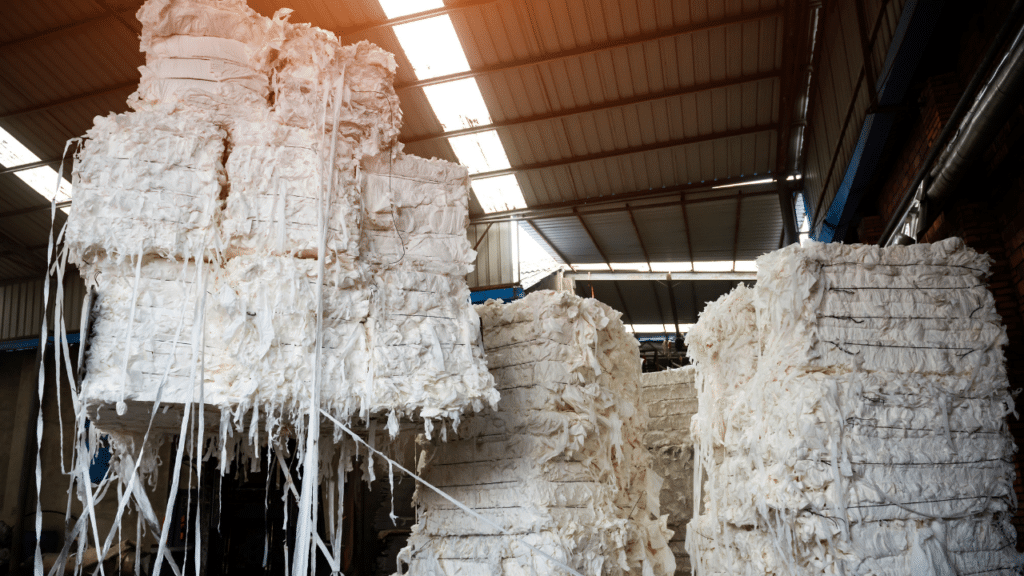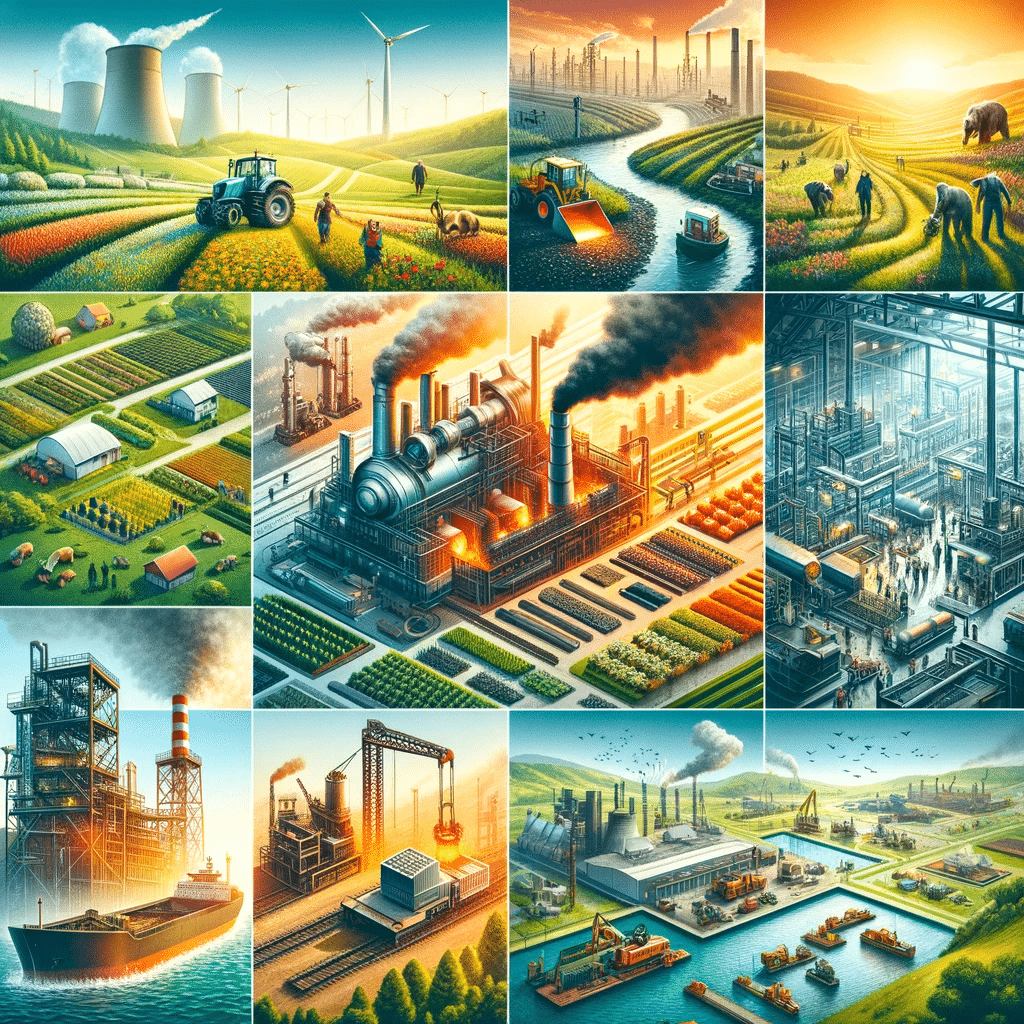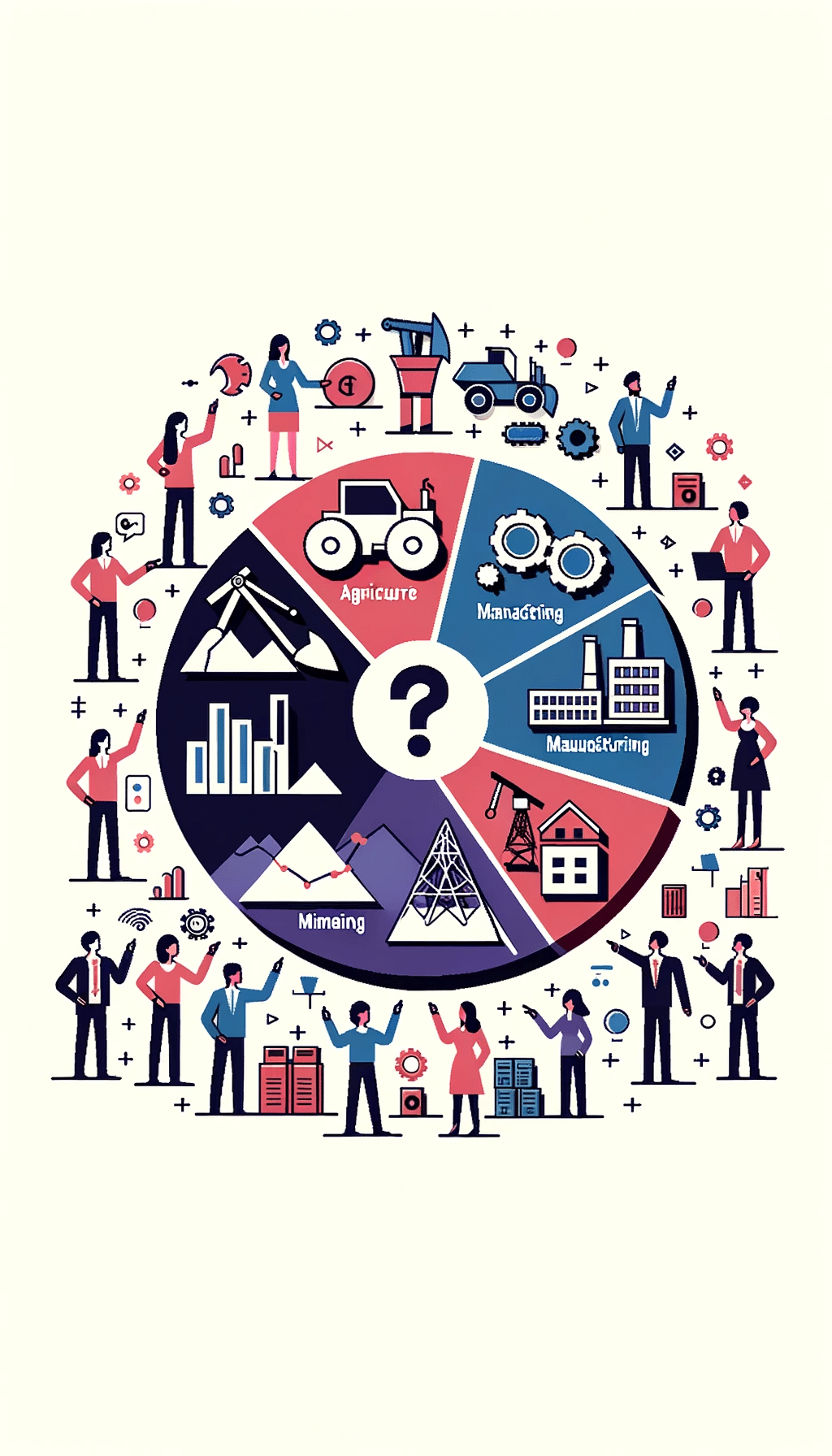
Imagine a world without the essentials—no metals for our machinery, no natural gas heating our homes, no raw materials for our everyday products.
This is where basic industries come into play, forming the backbone of our daily lives and the economy. These industries are the unsung heroes that supply the fundamental materials and resources other sectors rely on to thrive.
From the oil and gas industry fueling our vehicles to the agricultural companies feeding nations, basic industries are the bedrock upon which modern society is built. They don't just support economies; they propel innovation, job creation, and economic stability.
As we peel back the layers of these pivotal sectors, we uncover the vast tapestry of jobs and processes that are essential to progress. Labor statistics often highlight the significant employment opportunities provided by basic industries companies, underscoring their role in economic growth.
Basic industries provide more than just materials; they offer a foundation for other industries to innovate and expand. Each basic industries company, whether it's a titan of the paper industry or a key player in the extraction of natural gas, contributes to a chain of productivity and development that sustains and enhances our way of life.
Let's explore what companies are in the basic industries field and discover their critical role in shaping our world.
Defining Basic Industries Sector
Basic industries are the sectors that lay the foundation for all other industries to build upon. They are characterized by their production of raw materials, essential goods, and services that are the starting point for other products and industries.
Think of them as the roots of a tree, essential for nourishment and stability. These sectors include the likes of mining, which provides minerals and metals; agriculture, which produces food and raw materials; and energy, which offers electricity, oil, and gas extraction.
The role of basic industries extends far beyond their immediate outputs. They are pivotal in driving economic growth and development. By supplying raw materials, they fuel the production processes of other industries, contributing to a ripple effect of economic activity.
For instance, the steel produced by the basic industries is used in construction, automobile manufacturing, and even in technology sectors for hardware components.
Key Sectors of Basic Industries
Basic industries are diverse, each playing a unique role in the tapestry of the economy. They can be broadly categorized into several key sectors:
Mining Industry:

This sector is the starting point for materials like coal, precious metals, and minerals. It's the bedrock that supports everything from jewelry to smartphones, buildings to currency. Companies like Newmont Mining Corporation exemplify the vast majority of entities involved in extracting these essential resources.
Oil and Gas Industry:

As the primary energy source worldwide, this sector fuels transportation, heating, and electricity, and is a feedstock for chemicals and plastics. The gas industry, in particular, has earned a reputation for being a significant contributor to energy sources essential for daily life and economic development.
Agriculture Industry:

Beyond just food production, agriculture provides raw materials for clothing, biofuels, and pharmaceuticals, offering a plethora of basic industries jobs that pay competitively.
Chemical Industry:

This sector produces the building blocks for pharmaceuticals, plastics, and synthetic materials, impacting everything from healthcare to manufacturing. Companies like Sealed Air Corporation are key players in providing bio-industrial solutions and engineering skills that drive innovation.
Paper and Pulp Industry:

Essential for communication and packaging, this industry also plays a significant role in the move towards sustainable packaging solutions, with many basic industries producing goods that are integral to a variety of other industries.
Metal Manufacturing:

It's not just about construction. Metals are crucial in technology, automotive industries, and even in renewable energy technologies. The basic industry field of metal manufacturing is a cornerstone of industrial development.
Construction Materials:

These are the physical materials like cement and glass that shape our infrastructure. The basic industries field provides these foundational materials, which are indispensable for the construction of homes, offices, and public infrastructure.
The raw materials and natural resources produced by these basic industries are the lifeblood of secondary industries. Without the metals mined from the earth, there would be no cars, electronics, or buildings. Without the agricultural output, there would be no food products, biofuels, or natural textiles.
The impact of these raw materials is profound. They dictate the entire industry supply chain, influence global trade, and can even affect geopolitical dynamics. When basic industries thrive, they create a domino effect of prosperity, leading to growth in manufacturing, technology, and service sectors. Basic industries companies are deeply intertwined with these outcomes, often providing the impetus for economic growth and stability.
The Intersection of Technology and Basic Industries
In an era where technology intersects with every aspect of life, basic industries are no exception. This fusion is revolutionizing the way basic industries operate, from automated drilling rigs in the oil and gas industry to precision agriculture in farming. Technology is not just an add-on; it's becoming the core around which these industries innovate and grow.
Technology is reshaping basic industries in profound ways:
-
-
Automation: Robotics and AI are making mining and drilling safer and more efficient, changing the face of the basic industry.
-
-
-
Precision Agriculture: Drones and IoT devices help farmers monitor crops for better yield, a leap in the agriculture industries.
-
-
-
Smart Energy: Innovations like smart grids enhance energy production and distribution, particularly in the gas industry.
-
Take the mining sector, for instance. Advanced geospatial data analysis and robotics are transforming exploration and extraction processes, making them safer and more efficient. In agriculture, drones and IoT (Internet of Things) devices enable farmers to monitor crops and optimize yields with unprecedented precision. And in energy, smart grid technologies and AI are streamlining production and distribution to meet the demands of the 21st century.
These advancements not only bolster the sector but also have a ripple effect on other industries, enhancing supply chain efficiency and economic growth. Labor statistics reflect a growing demand for tech jobs in these fields, with basic industry jobs paying competitive wages to attract skilled professionals.
Companies involved in these sectors, from multinational corporations to specialty materials producers, are at the forefront of integrating these new technologies.
As these industries continue to evolve, they offer a wealth of job opportunities for job seekers with the right engineering skills, from heavy machinery operators to computer systems analysts. The global economy benefits from the economic stability and environmental sustainability efforts of these basic industries companies, which are essential energy sources and providers of raw materials.
For those considering a career in this field, company websites offer a portal to a company's career opportunities, highlighting the importance of basic industries in providing a good career path and a flexible work-life balance.
What companies are in the basic industries field ?
The basic industries field encompasses a range of sectors, including mining, chemicals, agriculture, and energy, and within these sectors operate some of the most pivotal companies shaping today's industrial world.
To answer the question what companies are in the basic industries field ? lets take a closer look at some of these key players:
BHP Group Limited
BHP Group Limited stands tall in the basic industries field, mining essential commodities like iron ore, copper, and uranium, as well as tapping into the oil and gas sector. Their commitment to sustainability and innovation is evident in their environmental practices and the safety measures they implement for their workforce.
Chevron
Chevron Corporation is a powerhouse in the gas industry, engaging in every aspect of oil and gas extraction and geothermal energy. Chevron is at the forefront of efficient energy solutions and is actively investing in renewable energy and advanced technologies.
Dow Chemical Company
The Dow Chemical Company is a global brand versatile entity within the chemical sector, offering a wide range of products for various applications, including agriculture and consumer care. Dow's commitment to sustainability is driving its mission to address global challenges.
DuPont
DuPont is a name synonymous with innovation in the basic industries field, providing specialized materials and solutions across diverse markets such as electronics and transportation. Their dedication to innovation goes hand in hand with their sustainability and safety initiatives.
Ecolab
Ecolab is a leader in water, hygiene, and infection prevention solutions, playing a vital role across key industries, including food service and healthcare. Their services are integral to ensuring clean water and safe environments, which are essential to the basic industries sector.
International Paper
International Paper marks its presence in the paper industry as one of the leading producers of fiber-based packaging and pulp. They offer sustainable packaging and paper solutions, emphasizing responsible practices within the field.
Masco Corporation
Masco Corporation is a global leader in the manufacture of home improvement and building products, contributing to the construction materials sector of the basic industries. Their range of products supports the infrastructure that underpins many other industries.
PPG Industries
PPG Industries specializes in coatings and paints, adding beauty and protection to the world. Their innovations are utilized across several sectors, including aerospace and automotive, showcasing the diversity of companies in the field.
Procter & Gamble
Procter & Gamble, or P&G, is a multinational corporation that touches lives daily with its range of consumer goods. Their products span personal care, hygiene, and cleaning, demonstrating how basic industries provide goods that are integral to everyday life.
Schneider Electric
Schneider Electric is revolutionizing energy management and automation, with a strong presence in homes, buildings, and industries. Their solutions are pivotal in driving energy efficiency and sustainability.
John Deere
John Deere, or Deere & Company, is iconic in the agriculture industry, known for its farming equipment. They also contribute to the industry with machinery for construction and forestry, supporting the infrastructure essential to these sectors.
ExxonMobil
ExxonMobil is a leading name in the oil and gas industry, known for its advanced energy solutions and contributions to chemical manufacturing. Their commitment to energy innovation and environmental stewardship is a testament to the values of the field.
BP
BP stands as a global energy company with a broad reach across oil, gas, and renewable energy, addressing the dual challenge of meeting energy demands while reducing carbon emissions, a critical aspect of the sector.
Rio Tinto
Rio Tinto is a mining company that exemplifies commitment to technology and innovation. Their global operations are dedicated to mining and processing mineral resources in the most sustainable ways, which is fundamental to the basic industries field.
BASF
BASF, one of the world's largest chemical producers, operates across various sectors, providing essential chemicals and products. Their innovation and sustainability efforts are key to the growth of the basic industries field.
Caterpillar
Caterpillar is the leading manufacturer of construction and mining equipment, providing the heavy machinery that powers development in numerous sectors within the basic industries field.
Unilever
Unilever's portfolio includes well-known brands in nutrition, hygiene, and personal care, reflecting the vast reach of basic industries in daily consumer life and their commitment to ethical practices.
General Electric
General Electric, or GE, operates in sectors like power and renewable energy, driving innovation and transforming industry infrastructure, which is central to the basic industries field.
Siemens
Siemens AG is a global leader in electronics and electrical engineering, driving innovation, efficiency, and sustainability in the industry, energy, and healthcare sectors.
These companies are just a few examples of the vast majority of entities that make up the basic industries field, each contributing to the largest industry sectors and providing a multitude of job opportunities.
They are the backbone of the basic industry, producing goods and services that are essential to the global economy and the everyday lives of people around the world.
Bridging the Gap: Acquiring Tech Skills
To thrive in the tech-forward landscape of basic industries, one must navigate a path of continuous learning and skill acquisition:
-
-
Educational Pathways: Degrees in fields like mechanical, chemical, or environmental engineering lay a strong foundation. For those eyeing the tech side, computer science or information technology degrees are key.
-
-
-
Specialized Bootcamps: Intensive bootcamps offer a quick, immersive learning experience in specific skills like coding, data analysis, or cybersecurity, often tailored to industry needs.
-
-
-
Professional Certifications: Certifications from recognized bodies can validate skills in project management, quality assurance, or specific technologies relevant to basic industries.
-
-
-
Workplace Learning: Progressive companies in the basic industries often provide on-site training or sponsor courses to keep their workforce at the cutting edge of technology.
-
The role of specialty materials and innovation in tech roles is equally significant:
-
-
In-Depth Material Science: A deep understanding of materials such as metals, polymers, and composites can lead to breakthroughs in product development and manufacturing processes.
-
-
-
Technological Synergy: Integrating advanced technologies like 3D printing or nanotechnology with traditional manufacturing can revolutionize production in basic industries.
-
-
-
Innovation Culture: Encouraging a workplace culture that values innovation and experimentation can lead to novel uses of those materials, driving industry growth.
-
-
-
Sustainability Focus: With a growing emphasis on environmental sustainability, knowledge of eco-friendly materials and green technologies is becoming increasingly important.
-
By equipping oneself with the right mix of technical knowledge and innovative thinking, professionals can bridge the gap between traditional industry practices and the technological demands of the future, ensuring that basic industries continue to be a robust and dynamic force in the economy.
Navigating the Job Market: Opportunities in Basic Industries
The job market in basic industries is dynamic and expansive, with a consistent demand for skilled professionals across various sectors. From the energy fields to the depths of mining operations, each sector has its unique needs and opportunities.
In the energy sector, for example, there's a significant push for sustainable and renewable resources, creating a surge in demand for roles focused on green technology and energy efficiency. Similarly, the mining industry is on the lookout for experts in exploration technologies and environmental management, reflecting a shift towards more sustainable practices.
Agriculture is embracing bioengineering and precision farming, opening up roles that blend traditional farming knowledge with cutting-edge technology. The chemical sector continues to prioritize process engineers who can innovate while upholding stringent safety standards.
To navigate this diverse job market:
-
-
Utilize Online Job Portals: Websites like Indeed and Glassdoor aggregate a vast array of job listings, while industry-specific platforms can narrow down your search to roles that match your expertise.
-
-
-
Leverage Company Websites: Many companies in post job openings on their websites. Applying directly through these portals can demonstrate a targeted interest in the company and allow for a more personalized application process.
-
-
-
Engage in Professional Networking: Platforms like LinkedIn are invaluable for making connections, discovering job openings, and showcasing your professional brand. Joining industry-specific groups and participating in discussions can also increase your visibility to potential employers.
-
-
-
Attend Industry Events: Career fairs and conferences offer the chance to meet with company representatives, learn about new developments, and get a sense of the industry's direction.
-
-
-
Consider Internships and Apprenticeships: For those new to the industry or looking to gain practical experience, internships and apprenticeships can provide an invaluable foot in the door.
-
-
-
Stay Updated with Training and Certifications: Pursuing additional certifications or training can set you apart, especially when they're recognized and valued within the industry.
-
By combining these strategies with a clear understanding of the evolving needs, job seekers can effectively position themselves in the market, finding roles that not only match their skillset but also align with their career goals. The key is to remain adaptable, continuously seek to enhance your skills, and stay connected with the industry pulse.

Craft the Perfect Resume with AI
- Your Content Recruiters use AI to scan resumes, so make sure yours stands out! With Huntr's AI Resume Builder, you can create a professional, tailored resume that helps get you noticed.
Compensation and Benefits in Basic Industries
The compensation packages in many basic industries also can be quite competitive, reflecting the essential nature of the work and the need for specialized skills. Here's an analysis of what one might expect in terms of pay and benefits:
Pay Structure: Salaries in basic industries vary widely depending on the role, experience, and geographical location. For instance, jobs in the oil and gas industry often command higher pay due to the specialized skills required and the demanding work environment. Similarly, positions in chemical manufacturing or mining may offer salaries above the national average to attract and retain talent in these critical sectors.
Health Insurance: Given the physical nature of many basic industries jobs, employers typically provide comprehensive health insurance plans. These plans often cover a range of medical services, sometimes including preventive health programs and access to wellness resources.
Work-Life Balance: While basic industries have traditionally been associated with demanding work schedules, there's a growing trend toward offering more flexible arrangements. This can include options for shift work, telecommuting for applicable roles, and generous leave policies. Companies recognize that a healthy work-life balance is crucial for employee satisfaction and retention.
Additional Benefits: Other benefits might include retirement plans, such as 401(k) matching, bonuses, profit-sharing schemes, and educational assistance programs. Some companies also offer perks like on-site childcare, fitness centers, or subsidized meals.
It's important for job seekers to look beyond the base salary and consider the entire compensation package. Benefits like health insurance and work-life balance measures can contribute significantly to overall job satisfaction and should be carefully weighed when considering a position in basic industries.
Conclusion
The basic industries are not just the cornerstone of the economy; they are the bedrock upon which modern civilization is built. From the minerals extracted by BHP Group Limited to the energy solutions provided by Chevron and ExxonMobil, these sectors ensure the smooth operation of our daily lives and the continuous advancement of technology and infrastructure.
The diversity of roles and the chance to contribute to essential global operations make this sector not just a wise career choice, but a fulfilling one as well.
We invite you to delve deeper into the world of basic industries. Discover the companies that are shaping our future and learn more about the opportunities they offer.
For further reading, explore our related blog posts:
- Understanding Basic Industries: 2024 Comprehensive Guide
- How many jobs are available in basic industries in 2024?
- Basic Industries Examples: 4 Pillars of Global Prosperity
- what do basic industries jobs pay in 2024
- is basic industries a good career path in 2024
FAQ
What are the Best Paying Jobs in Basic Industries?
What is the definition of basic industry?
Is basic industries a good career path?
How many jobs are available in basic industries?
What companies are in the basic industries field
BHP Group Limited, Chevron, Dow Chemical Company, Masco Corporation, and International Paper
What is an example of a basic industry?
A quick overview of the topics covered in this article.
Latest Posts
February 28, 2026
February 28, 2026
Subscribe to our newsletter
Get valuable insights and business guidance sent to your email.










